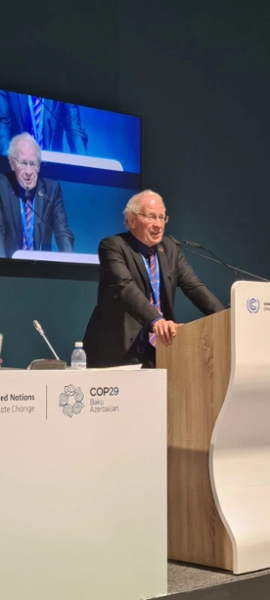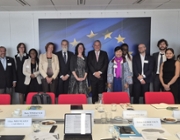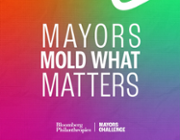CLGF giving a voice to local government at COP29

29 November 2024
The COP, or the Conference of the Parties, is both important and ongoing, serving as a stark reminder that, globally, we must commit to working in partnership to tackle the existential threat of climate change. The damage caused by climate change knows no borders and has an increasingly detrimental effect on all regions of the Commonwealth, including many vulnerable Small Island Developing States (SIDS), for whom climate change equates to loss of life, loss of infrastructure and damage to local and national economies for decades.
Outcomes
The Commonwealth Local Government Forum (CLGF) was represented at the COP29 held in Baku last month by our Secretary-General Emeritus, Dr Carl Wright who shared his thoughts on the outcomes.
He described how the media focus was largely on the meagre outcomes of the financial negotiations with a new goal of $300 billion pa agreed to tackle climate change by 2035 - although within a vaguer overall target of $1.3 trillion, well short of the some $5-6 trillion actually needed. Indeed by 2035 $300 billion will represent little improvement on the earlier target of $100 billion allowing for inflation.
Disappointment but progress overall
There was discussion on the 2023 COP pledges on transitioning away from fossil fuels, and about limited progress made on other key areas including mitigation, adaptation and loss and damage, with some decisions being postponed until 2025. Yet despite these disappointments there was progress overall, and countries like Brazil and the UK made encouraging announcements about enhanced Nationally Determined Contributions (NDCs) to accelerate their drive to carbon neutrality.
Positive policies
Dr Wright also reported on the lack of media coverage on the numerous detailed decisions and positive policy recommendations coming out of COP29, in a wide range of areas. These included initiatives on energy, food, water, agriculture (include supporting farmers to achieve sustainable farming), science and technology, human development, biodiversity, urbanisation and much more.
Guiding urban sustainability
One of the important sessions that Dr Wright attended was on urbanisation alongside local government leaders, including a ministerial meeting co-convened by UN Habitat. This featured in-depth discussions on subjects such as green construction and achieving energy efficiency in buildings and resulted in the adoption of the Multisectoral Actions Pathways Declaration for Resilient and Healthy Cities (MAP). Dr Wright explained: “This will guide urban sustainability and climate responses, aided by the appointment of a Special Envoy for Urban Climate Action and comes following high-level endorsement of the focus on urbanisation and sustainable cities, at the recent Commonwealth Leaders Summit in Samoa.”
Driven at the local level
Whatever the political outcome of COP, climate action – just like the implementation of the Sustainable Development Goals (SDGs) - will be driven at local or regional level, by mayors and community leaders and by the private sector, who were all extensively present in Baku.
In addition to the key event on 20 November at the Ministerial Meeting on Urbanisation & Climate, Dr Wright also made formal presentations at the Platforma political meeting, talking about Apia outcomes including pa 7 of the Commonwealth Heads of Government Meeting Communique on sustainable urbanisation/cities; the side event on 'Green' education in schools; the Council of European Municipalities and Regions event on local government engagement with the Loss & Damage Fund, chaired by J P Mbassi; and the climate finance and UNEP sponsored event on green building/construction. As well as advocating for local government across the Commonwealth, Dr Wright was able to reference the work of Canterbury City Council and the Canterbury Climate Action Partnership, with which he is personally involved. Informal discussions took place at the Commonwealth Secretary-General’s reception with several people, including: Patricia Scotland, Toeolesulusulu Cedric Schuster, Minister of Natural Resources and Environment of Samoa; and the new UN Habitat Executive Director, HE Anaclaudia Rossbach.
Strong local representation
In addition to strong representation of CLGF at the COP, local government was also advocated for by the representative of the Local Government Association for England and Wales, Councillor Marianne Overton, with effective coordination by LGMA through Yunus Arikan of ICLEI and his team.
Importance of subnational level
Dr Wright described how the COP provided a heady and vibrant mix of high level negotiations, grass roots activism and a rich multitude of expertise, discussions and knowledge exchange often going late into the night. In summing up the event, he said: “COP29 in Baku exposed an inadequate global response to the climate crisis, notably in respect of marshalling the necessary climate finance required to support climate adaption and mitigation. It did, however, result in many positive climate initiatives, especially at local, community and subnational level, underlined by the presence of so many mayors and local government representatives in Baku. Just how important the sub national level can be was underlined by the commitment of 350 US mayors and over 20 US governors to the Paris Climate goals following the American Presidential election.”
He concluded by emphasising: “I know CLGF and its members across the Commonwealth firmly share that commitment to safeguarding our planet's fragile environment and gravely endangered biodiversity.”
Back to News





